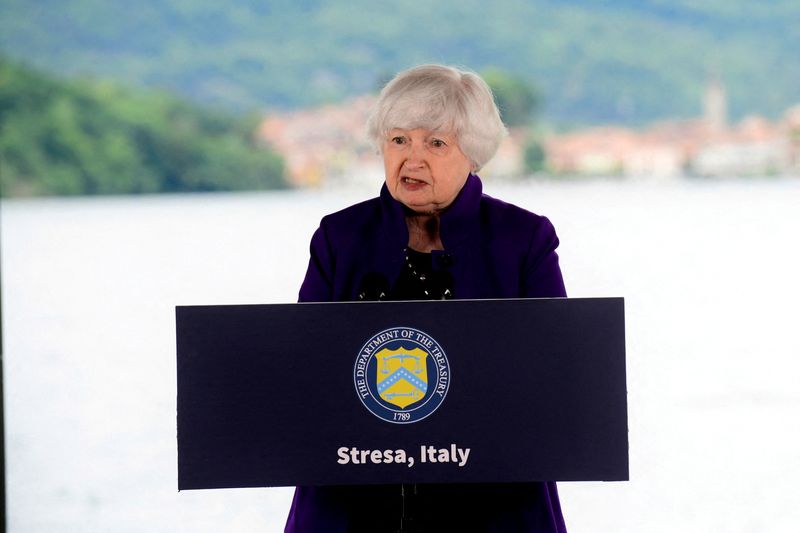STRESA, Italy (Reuters) – U.S. Treasury Secretary Janet Yellen told Reuters that European banks face growing risks operating in Russia and the U.S. is looking at strengthening its secondary sanctions on banks found to be aiding transactions for Russia’s war effort.
“We are looking at potentially a tougher stepping-up of our sanctions on banks that do business in Russia,” Yellen told Reuters in an interview, declining to provide specifics and not identifying any banks at which they could be aimed.
Speaking on the sidelines of a G7 finance leaders meeting in northern Italy, Yellen said that sanctions related to banks’ dealings in Russia would only be imposed “if there was a reason to do so, but operating in Russia creates an awful lot of risk,” she added.
Asked whether she would like to see Austria’s Raiffeisen Bank International and Italian bank UniCredit pull out of Russia, Yellen said: “I believe their supervisors have advised them to be extremely careful about what they do there.”
‘GET OUT’
European Central Bank policymaker Fabio Panetta had clear instructions for Italian banks on Saturday telling reporters that lenders must “get out” of Russia because staying in the country brings a “reputational problem.”
Raiffeisen is the largest European lender doing business in Russia, followed by UniCredit. Another large Italian lender, Intesa Sanpaolo (OTC:ISNPY) is working to dispose of its Russian business.
U.S. President Joe Biden’s new secondary sanctions authority gives the Treasury the power to cut off banks from the U.S. financial system if they are found to be assisting the circumvention of primary sanctions against Russian and other entities over Moscow’s war in Ukraine.
Yellen and other U.S. Treasury officials have said that Russia’s economy is increasingly a “war economy” making it more difficult to distinguish between civilian and military or dual-use transactions.
The existence of the secondary sanctions has already chilled banks’ engagement with Russia, but Yellen has expressed concern that Russia is managing to find avenues to acquire goods needed to boost its military production, citing transactions through China, the United Arab Emirates and Turkey.
WARNING LETTER
Earlier this month, the Treasury warned Raiffeisen in writing that its access to the dollar-denominated financial system could be cut off because of its Russia dealings, citing a proposed 1.5 billion euro ($1.6 billion) deal with a sanctioned Russian tycoon, a person who has seen this correspondence told Reuters.
After the warning, Raiffeisen dropped plans for the industrial stake linked to tycoon Oleg Deripaska, marking a setback for the lender more than two years after the invasion of Ukraine.

The pressure underscored Washington’s willingness to take European banks to task over their Russian ties.
In Germany’s financial capital Frankfurt on Tuesday, Yellen warned bank CEOs to step up efforts to comply with sanctions against Russia and shut down circumvention efforts to avoid the potential for severe penalties.
To read the full article, Click Here

